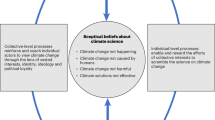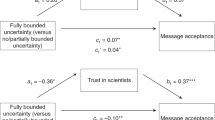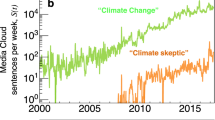Abstract
Although most experts agree that CO2 emissions are causing anthropogenic global warming (AGW), public concern has been declining. One reason for this decline is the ‘manufacture of doubt’ by political and vested interests, which often challenge the existence of the scientific consensus. The role of perceived consensus in shaping public opinion is therefore of considerable interest: in particular, it is unknown whether consensus determines people’s beliefs causally. It is also unclear whether perception of consensus can override people’s ‘worldviews’, which are known to foster rejection of AGW. Study 1 shows that acceptance of several scientific propositions—from HIV/AIDS to AGW—is captured by a common factor that is correlated with another factor that captures perceived scientific consensus. Study 2 reveals a causal role of perceived consensus by showing that acceptance of AGW increases when consensus is highlighted. Consensus information also neutralizes the effect of worldview.
This is a preview of subscription content, access via your institution
Access options
Subscribe to this journal
Receive 12 print issues and online access
$209.00 per year
only $17.42 per issue
Buy this article
- Purchase on Springer Link
- Instant access to full article PDF
Prices may be subject to local taxes which are calculated during checkout


Similar content being viewed by others
References
Anderegg, W. R. L., Prall, J. W., Harold, J. & Schneider, S. H. Expert credibility in climate change. Proc. Natl Acad. Sci. USA 107, 12107–12109 (2010).
Doran, P. T. & Zimmerman, M. K. Examining the scientific consensus on climate change. EOS 90, 21–22 (2009).
Oreskes, N. The scientific consensus on climate change. Science 306, 1686 (2004).
Freudenburg, W. R. & Muselli, V. Global warming estimates, media expectations, and the asymmetry of scientific challenge. Glob. Environ. Change 20, 483–491 (2010).
Brulle, R. J., Carmichael, J. & Jenkins, J. C. Shifting public opinion on climate change: An empirical assessment of factors influencing concern over climate change in the U.S., 2002–2010. Climatic Change 114, 169–188 (2012).
Scruggs, L. & Benegal, S. Declining public concern about climate change: Can we blame the Great Recession? Glob. Environ. Change 22, 505–515 (2012).
Ding, D., Maibach, E., Zhao, X., Roser-Renouf, C. & Leiserowitz, A. Support for climate policy and societal action are linked to perceptions about scientific agreement. Nature Clim. Change 1, 462–466 (2011).
Dunlap, R. E. & McCright, A. M. A widening gap: Republican and Democratic views on climate change. Environ. Sci. Policy Sustainable Dev. 50, 26–35 (2008).
Kahan, D. M. Fixing the communications failure. Nature 463, 296–297 (2010).
Heath, Y. & Gifford, R. Free-market ideology and environmental degradation: The case of belief in global climate change. Environ. Behav. 38, 48–71 (2006).
McCright, A. M. & Dunlap, R. E. Anti-reflexivity: The American conservative movement’s success in undermining climate science and policy. Theor. Culture Soc. 27, 100–133 (2010).
Kahan, D. M., Jenkins-Smith, H. & Braman, D. Cultural cognition of scientific consensus. J. Risk Res. 14, 147–174 (2011).
Rolfe-Redding, J., Maibach, E. W., Feldman, L. & Leiserowitz, A. Republicans and Climate Change: An Audience Analysis of Predictors for Belief and Policy Preferences (Yale Project on Climate Change Communication, 2012).
Wilson, R. S., Arvai, J. L. & Arkes, H. R. My loss is your loss... sometimes: Loss aversion and the effect of motivational biases. Risk Anal. 28, 929–938 (2008).
Puhl, R. M., Schwartz, M. B. & Brownell, K. D. Impact of perceived consensus on stereotypes about obese people: A new approach for reducing bias. Health Psychol. 24, 517–525 (2005).
Stangor, C., Sechrist, G. B. & Jost, J. T. Changing racial beliefs by providing consensus information. Personal. Soc. Psychol. Bull. 27, 486–496 (2001).
Zitek, E. M. & Hebl, M. R. The role of social norm clarity in the influenced expression of prejudice over time. J. Exp. Soc. Psychol. 43, 867–876 (2007).
Conway, L. C. I. & Schaller, M. When authorities commands backfire: Attributions about consensus and effects on deviant decision making. J. Personal. Soc. Psychol. 89, 311–326 (2005).
Leviston, Z. & Walker, I. A. Baseline Survey of Australian Attitudes to Climate Change: Preliminary Report Technical Report, CSIRO (Behavioural Sciences Research Group, 2010).
Gignac, G. E. Multi-factor modeling in individual differences research: Some recommendations and suggestions. Personal. Individual Differ. 42, 37–48 (2007).
Burnham, K. P. & Anderson, D. R. Model Selection and Multimodel Inference: A Practical Information-theoretic Approach 2nd edn (Springer, 2002).
Cohen, J. A power primer. Psychol. Bull. 112, 155–159 (1992).
Hayes, A. F. & Matthes, J. Computational procedures for probing interactions in OLS and logistic regression: SPSS and SAS implementations. Behav. Res. Methods 41, 924–936 (2009).
Lewandowsky, S., Oberauer, K. & Gignac, G. E. NASA faked the moon landing therefore (climate) science is a hoax: An anatomy of the motivated rejection of science. Psychol. Sci. (in the press).
Chigwedere, P., Seage, G. R., Gruskin, I., Lee, S. & Essex, T-H. Estimating the lost benefits of antiretroviral drug use in South Africa. J. Acq. Immun. Def. Syn. 49, 410–415 (2008).
Nattrass, N. Still crazy after all these years: The challenge of AIDS denialism for science. AIDS Behav. 14, 248–251 (2010).
Kalichman, S. C., Eaton, L. & Cherry, C. ‘There is no proof that HIV causes AIDS’: AIDS denialism beliefs among people living with HIV/AIDS. J. Behav. Medicine 33, 432–440 (2010).
Kahan, D. M., Braman, D., Slovic, P., Gastil, J. & Cohen, G. Cultural cognition of the risks and benefits of nanotechnology. Nature Nanotech. 4, 87–90 (2009).
Kahan, D. M., Braman, D., Cohen, G. L., Gastil, J. & Slovic, P. Who fears the HPV vaccine, who doesn’t, and why? An experimental study of the mechanisms of cultural cognition. Law Human Behav. 34, 501–516 (2010).
Carrico, A. R. et al. Energy and climate change: Key lessons for implementing the behavioral wedge. J. Energ. Environ. Law 61–67 (2011).
Lewandowsky, S., Ecker, U. K. H., Seifert, C., Schwarz, N. & Cook, J. Misinformation and its correction: Continued influence and successful debiasing. Psychol. Sci. Public Int. 13, 106–131 (2012).
Kelly, J. A. et al. HIV risk behavior reduction following intervention with key opinion leaders of population—An experimental-analysis. Am. J. Public Health 81, 168–171 (1991).
Kelly, J. A. et al. Randomised, controlled, community-level HIV-prevention intervention for sexual-risk behaviour among homosexual men in US cities. Lancet 350, 1500–1505 (1997).
Douglas, K. M. & Sutton, R. M. Right about others, wrong about ourselves? Actual and perceived self-other differences in resistance to persuasion. British J. Soc. Psychol. 43, 585–603 (2004).
Douglas, K. M. & Sutton, R. M. The hidden impact of conspiracy theories: Perceived and actual influence of theories surrounding the death of Princess Diana. J. Soc. Psychol. 148, 210–221 (2008).
Lewandowsky, S. Popular consensus: Climate change set to continue. Psychol. Sci. 22, 460–463 (2011).
Schär, C. et al. The role of increasing temperature variability in European summer heatwaves. Nature 427, 332–336 (2004).
Rahmstorf, S. & Coumou, D. Increase of extreme events in a warming world. Proc. Natl Acad. Sci. USA 108, 17905–17909 (2011).
Acknowledgements
This research was supported by a Discovery Grant and a Linkage Grant from the Australian Research Council and an Australian Professorial Fellowship to the first author. We gratefully acknowledge the assistance of J. Wong during data collection. We thank G. Brown for his suggestions concerning the questionnaire design and J. Cook, T. Lombrozo and K. Oberauer for comments on an earlier draft of this article. S.L. receives funding from the Australian Research Council (ARC), including an ARC Linkage Grant with the Australian Department of Climate Change and Energy Efficiency.
Author information
Authors and Affiliations
Contributions
S.L. designed and supervised the studies and wrote the paper. G.E.G. and S.L. jointly conducted the analyses and G.E.G. contributed to writing of the article, and S.V. was involved in design and execution of Study 2.
Corresponding author
Ethics declarations
Competing interests
The authors declare no competing financial interests.
Supplementary information
Supplementary Information
Supplementary Information (PDF 511 kb)
Rights and permissions
About this article
Cite this article
Lewandowsky, S., Gignac, G. & Vaughan, S. The pivotal role of perceived scientific consensus in acceptance of science. Nature Clim Change 3, 399–404 (2013). https://doi.org/10.1038/nclimate1720
Received:
Accepted:
Published:
Issue Date:
DOI: https://doi.org/10.1038/nclimate1720
This article is cited by
-
Public Conceptions of Scientific Consensus
Erkenntnis (2024)
-
Combatting rumors around the French election: the memorability and effectiveness of fact-checking articles
Cognitive Research: Principles and Implications (2023)
-
Participating in a climate prediction market increases concern about global warming
Nature Climate Change (2023)
-
Climate change beliefs and their correlates in Latin America
Nature Communications (2023)
-
Public response to solar geoengineering: how media frames about stratospheric aerosol injection affect opinions
Climatic Change (2023)



